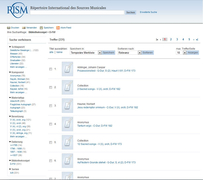Polish Week, Part 3: Using the RISM Online Catalog's Filters with Monastic Collections
Guido Kraus
Friday, June 26, 2015

At the conference Klasztor i muzyka / Monasteries and Music, which we described in this space on Wednesday, our coworker Guido Kraus gave a paper entitled “Historical music sources of cloister holdings from different orders in German speaking countries. Repertories in comparison,” touching on musicological methods, statistics, geographical considerations, and historical aspects. The paper explored what kind of place the RISM online catalog can have when asking musicological questions and where the significance of the records and their numbers might lie. Manuscript collections at the following religious institutions were used for analysis and comparison: the Prämonstratenser-Stift in Schlägl, Austria (A-SCH), Kloster Einsiedeln in Switzerland (CH-E), and the Benediktinerinnenabtei Frauenwörth in Chiemsee, Germany (D-FW).
After searching these sigla in the RISM catalog (using an Advanced search in the field Library siglum), the filters in the column on the left offer an overview of the collections and can already say something about its unique characteristics. The search filters show genres, composers, different material types, scoring, dating, and the library sigla–the location of the musical sources.
Searching for the library siglum A-SCH quickly leads the user to a characteristic of this collection: under Scoring, the instrument baryton stands out.
In the eighteenth-century manuscript collection of CH-E, the “London Bach” Johann Christian Bach (1735-1782) is the most common famous composer.
The composer filter also leads to a feature of D-FW: Michael Haydn is the most frequent composer.
There are, of course, reasons and a variety of causes for all of these features in the collections, brought to the surface by the filters in the catalog. Now the work of the musicologist begins, answering questions as to the why and deducing information from the results. Next to its documentary usefulness at the initial stages of musicological work, the RISM catalog is a demonstrably indispensable instrument.
Share Tweet EmailCatégorie: Evénements

